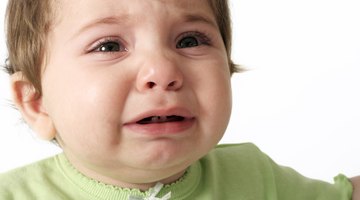Food for a Vomiting Toddler
Feeding a vomiting toddler can be difficult, but it is necessary to help him recover.
Even if the toddler throws up the majority of the liquids and food that you feed him, he is still reaping some nutrition from those items. According to the book "What to Expect: The Toddler Years," keeping your toddler nourished while he's sick ensures that he doesn't develop serious dehydration.
Vomiting
Vomiting can be a symptom of a few different illnesses. If the child only vomits once or twice, motion sickness or excessive crying could be the trigger.
However, if your toddler throws up repeatedly, the cause could be a viral or bacterial stomach bug, a food allergy, food poisoning or another type of infection such as a urinary tract infection, pneumonia or an ear infection. If you suspect the cause is something that's best treated at home, such as a simple flu virus, you should make sure to keep your child hydrated and nourished.
You should introduce your toddler to food and beverages in steps when she's vomiting. The website Ask Dr. Sears says that during the first stage of illness, when your toddler is throwing up every five to 30 minutes, you shouldn't attempt to give your child anything other than small sips of room-temperature water because all food and liquids will just come back up.
As the vomiting subsides to once every hour or so, you can introduce liquid sustenance to your toddler. When your toddler has pretty much stopped throwing up, begin feeding her simple, easy-to-digest solids.
Liquids

What Can My Toddler Eat When She Is Throwing Up?
Learn More
When giving your vomiting child liquids, Ask Dr. Sears recommends that you stick to simple beverages. Start with water, then move on to oral electrolyte solution, sports drinks and white grape juice. Children who are still breastfed can have breast milk as well. The website says that parents should steer clear of soda and most juices because they contain a lot of sugar that can worsen dehydration.
Solids
Once the child is well enough to work his way up to solids, start with a light chicken or vegetable stock.
From there, try bland foods like un-buttered toast, saltine crackers, rice, dry cereal, yogurt, fruit and applesauce. Stay away from fatty or fried foods, as they can irritate the child's stomach.
Considerations

How to Stop a Toddler's Diarrhea
Learn More
In certain cases, feeding your toddler while she's vomiting can make things worse. If you suspect your toddler consumed something she shouldn't have, such as medication or toxic cleaning products, go to the emergency room immediately. Likewise, if you suspect a medical condition that's more serious than a simple flu bug has overtaken your toddler, call the doctor or go to the hospital. If you can't get the vomiting under control within a few hours and your toddler exhibits signs of dehydration, such as sunken eyes, listlessness and a fast heartbeat, she likely needs to get intravenous fluids at the hospital.
Related Articles
- "What to Expect: The Toddler Years"; eidi Murkoff, Arlene Eisenberg and Sandee Hathaway; 1996
- BabyCenter.com: Vomiting
- AskDrSears.com: Vomiting










